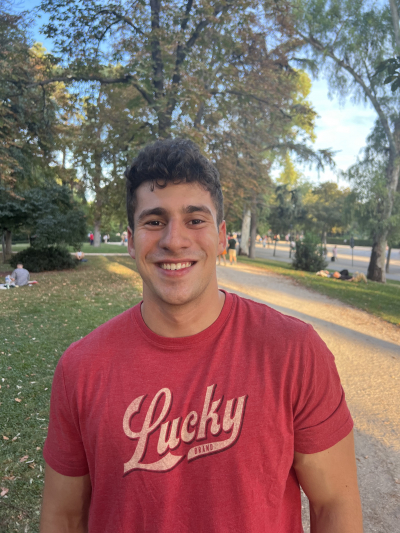Piano and Pre-Med: Achieving a Balance

For junior Alex Ozonoff, declaring a major in Biology was the obvious choice — after some soul searching and deep dives into entomology, epidemiology and microbiology, that is. And as his career decisions began to feel more real than hypothetical, he fixated on becoming a doctor.
“My mother is a physician assistant, and my dad is a surgical technician, so I’ve always been exposed to medicine,” he explains. “It seemed clear to me from early on what I’d pursue.”
On the pre-med track with a concentration in Biochemistry, Ozonoff is part of the Lefkowitz Lab. He’s also performed research in the Ramanujam Lab, assisting in the study of novel treatments for chemo-resistant breast cancer tumors, and formulated a nationally used database of rare disease treatment guidelines during his time with the National Organization of Rare Disorders.
But Ozonoff also makes room in his schedule to minor in Music, taking classical piano lessons and participating in Duke piano areas, which are recitals held amongst Duke piano professors and students to showcase the work done over the semester.
We sat down with the junior to discuss the benefits of STEM and the arts, his entrée into Music at Duke and his plans after graduation.
How were you first introduced to Duke’s Department of Music?
During my first semester, I took one of four Music Theory classes at the Biddle Music Building. I had intended on taking piano lessons in some capacity when I came to Durham, and as I walked into the building on the second day of classes, I saw an advertisement for piano lessons taught by Duke faculty.
After some email exchanges, I coordinated an audition with the Music faculty and shortly after, enrolled in piano lessons with David Heid.
Why is it important for you to include music courses in your studies at Duke when you are focused on a medical career?
I think it’s easy to lose interest in my passions and hobbies as classes and commitments become more time-consuming. Even in high school, there was a brief period when I considered quitting piano entirely because balancing school, sports, extracurriculars and family time was too mentally exhausting for me to handle.
But sticking with piano, even as everything grew increasingly difficult, has proven to be beyond beneficial for my mental health and one of the best choices I could have made. Playing piano has always been relaxing for me, and in an environment as highly stressful as Duke’s can be — especially during finals season — any outlet counts.
Have you found that your music studies and biology studies are mutually beneficial?
All my music classes and lessons require a different mode of thinking, which is a nice break from multiple STEM courses and brute memorization. Spacing out my STEM and music classes, each requiring a certain skill set, is so helpful to avoid burnout.
I also find that I don’t fully appreciate what I have until it’s gone, and music applies in the same way. I love my Biology courses, but having piano as my light at the end of the tunnel makes the difficult test studying, lab discussion writing and long lectures much more bearable.
Although practicing at 11:00 p.m. the night before my lesson may feel like a chore at times, I always leave the practice room feeling refreshed, satisfied and much happier than when I entered. The space between STEM and non-STEM makes each that much sweeter.
What do your post-Duke plans include?
After I graduate, I plan on taking a gap year to apply to medical school and to continue my research in the Lefkowitz Lab. I’m working on multiple reviews for data recently collected in the lab, which will hopefully help pave the road towards medical school as I prepare to take the MCAT this coming fall.
My current long-term goal is to be an interventional cardiologist, but that plan could change during medical school.




